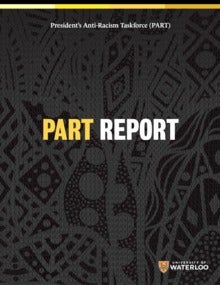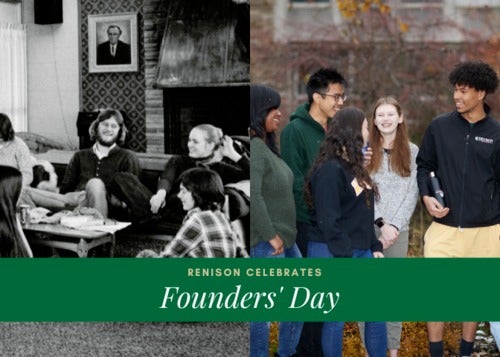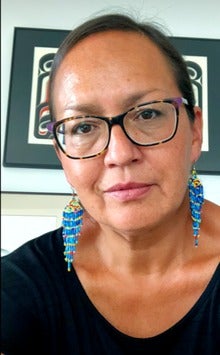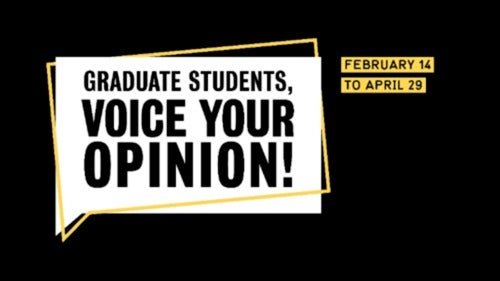- President's Anti-Racism Taskforce releases report
- New approach to advance care planning preferred by Canadian long-term care residents
- Waterloo selected to compete in four-year EV contest
- Renison Founders' Day celebrations will turn hope into action
- Have your say: Canadian Graduate and Professional Student Survey ends Friday
- WUSA's poster run returns and other notices, bills, and posts
Editor:
Brandon Sweet
University Communications
bulletin@uwaterloo.ca
President's Anti-Racism Taskforce releases report


After more than a year of planning and consultations with the University community, the President’s Anti-Racism Taskforce (PART) has developed eighty-eight recommendations aimed at rooting out and eliminating racism at the University.
PART is comprised of a team of advisors from Black, Indigenous and other racialized groups on campus, committed to addressing racism at the University. These individuals formed working groups and implementation teams, which were tasked with connecting with the University community to develop an overarching framework for dismantling racism and discrimination, and for building and sustaining an inclusive environment.
PART has suggested leaders across the University who will be responsible for each recommendation. The Office of the President will support these leaders with the resources, programs, services, initiatives, and other activities needed to implement the recommendations.
“I am pleased to receive PART’s comprehensive report with eighty-eight recommendations to address racism at the University,” said Vivek Goel, president and vice-chancellor. “Implementing the PART report’s recommendations requires a collective effort and I look forward to working with the University community to carry out this important work."
University leaders will regularly review and discuss progress on implementing these recommendations. Progress updates and other accountability frameworks will be shared through the Anti-racism website and other communications channels.
“Though we have a great deal of work ahead of us, the PART report highlights the great work that has already happened across our campuses including: two diplomas in Black Studies starting Fall 2022, the Black Excellence and Indigenous Excellence Cluster Hire initiatives, ongoing University-wide events, such as the Anti-racism book club, and the ongoing Equity Data survey,” Goel said.
President Goel has expressed his sincere gratitude to the members of PART and its working groups, and all members of our community who have been involved in anti-racism initiatives across our campuses, including the Community Collaborative, and other groups that were formed for similar purposes.
“It takes bravery, dedication and resilience to do this work,” he said. You have worked tirelessly to meet your mandates, responsibilities, and objectives, which you fully fulfilled in the face of the pandemic and other challenges. I am grateful for the work you have accomplished for the betterment of the University. You are a shining light for us all.”
The president said that anti-racism is the shared responsibility of the entire community – not that of a specific leader or a campus unit. He called on all faculty members, students and staff and the wider University community to work together to assist and support those accountable for PART’s recommendations, and to look for ways to implement anti-racism into their daily work.
President Goel will host a president's forum on Thursday, May 19 at 10:00 a.m. to spark a conversation about the work of PART, the final report and its eighty-eight recommendations to address racism at the University. Register now.
New approach to advance care planning preferred by Canadian long-term care residents

Researchers have developed a better way to support end-of-life planning in long-term care homes, according to a recent study.
The researchers also found that only 40 per cent of homes were routinely involving residents in end-of-life care discussions.
“Often people assume that a non-capable resident can’t participate, but there are other ways of communicating and understanding an individual’s preferences,” said George Heckman, a researcher in Waterloo’s School of Public Health Sciences and Schlegel Research Chair with the Schlegel-UW Research Institute for Aging.
The new approach to support end-of-life planning, Better tArgeting, Better outcomes for frail ELderly patients (BABEL), was found to be much more comprehensive than the usual manner in which long-term care homes conduct advance care planning.
The BABEL approach, developed by researchers at the Universities of Waterloo, Manitoba and Calgary, uses a tailored, person-centred approach based on best practices, and was designed with stakeholder input. BABEL was tested in 29 long-term care homes in three provinces: Ontario, Manitoba and Alberta.
Advance care planning is a critical process that ensures individuals’ values, wishes and preferences are understood and honoured at the end of life. BABEL achieves that by involving residents as active participants and putting their values and wishes first. Since it is hard for individuals to think about hypotheticals, the care team focuses on situations most likely to happen to a resident and how outcomes of different treatments might align with their individual goals.
“It’s a conversation that needs to happen often, as health status changes, and it involves residents, family members and the care team,” Heckman said. “As a physician, I know how important care at end of life is for individuals and their families, and this is an opportunity to get this right. BABEL certainly seems to help residents and substitute decision-makers with these otherwise challenging conversations and paves the way for more timely and comprehensive palliative care.”
Residents who participated in BABEL also avoided unhelpful and potentially harmful treatments at end of life. “Reducing the use of unnecessary treatments is often preferred at the end of life when comfort becomes a higher priority,” Heckman said.
“Reducing the unnecessary use of antibiotics in care settings also has broader benefits, given its current overuse.” The study found that lower use of antibiotics in participating residents did not impact survival.
The study, detailing the researchers’ findings, was authored by Heckman, the University of Manitoba’s Allan Garland and a team of Canadian researchers. It was published in the journal Age and Ageing. The research was funded by the Canadian Frailty Network and Research Manitoba.
Waterloo selected to compete in four-year EV contest

Waterloo students will work on a donated 2023 Cadillac LYRIQ as competitors in the four-year EcoCAR EV Challenge.
This article was originally published on the Faculty of Engineering website.
A team from the University of Waterloo has been named to compete in a four-year event to engineer a next-generation, battery-powered electric vehicle.
Waterloo will tackle the EcoCAR EV Challenge alongside teams from 14 other North America schools including the Georgia Institute of Technology and Virginia Tech. It is one of only two Canadian universities selected.
Sponsored by the United States Department of Energy, General Motors and MathWorks, and managed by the Argonne National Laboratory, the event challenges students to use the latest automation and vehicle connectivity to improve energy efficiency, add features for consumers and help the automotive industry meet its decarbonization needs.
It will also include a major focus on diversity, equity and inclusion while fostering clean energy mobility solutions.
“These budding energy leaders are heeding President Biden's call to get more Americans into EVs,” U.S. Secretary of Energy Jennifer M. Granholm said in a media release today. “Collegiate competitions like EcoCAR are critical to building a clean energy talent pipeline that reflects the diversity of America and make room for more domestic manufacturing to strengthen our energy independence.”
Teams chosen for the prestigious event, which begins this fall and continues until the spring of 2026, will receive extensive financial support and mentoring while competing for prize money by building on a donated 2023 Cadillac LYRIQ.
Renison Founders' Day celebrations will turn hope into action

A message from Renison University College.
For over 60 years, with each Founders’ Day celebration, Renison staff, faculty, students, alumni, donors and other community members come together to honour our core values and the work that we do to promote them. This annual celebration includes formally recognizing individuals who live these values and help to advance them each and every day. To become a Renison Honouree is to be welcomed into a select company of founders of positive change.
Turning Hope into Action - Renison 2022 Founders' Day Celebrations will take place Thursday, April 28 at 7:00 p.m. online. Register for the event.
Keynote Speaker: Cornelia (Nel) Wieman, MSc, MD, FRCPC

Dr. Nel Wieman is the Deputy Chief Medical Officer at the First Nations Health Authority (FNHA) in British Columbia. She is Anishinaabe (Little Grand Rapids First Nation, Manitoba) and lives, works and plays on the unceded territory of the Coast Salish peoples – the səl̓ílwətaʔɬ (Tsleil-Waututh), Sḵwx̱wú7mesh (Squamish), and xʷməθkʷəy̓əm (Musqueam) Nations. Dr. Wieman has served as the President of the Indigenous Physicians Association of Canada (IPAC) since 2016.
Dr. Wieman completed her medical degree and psychiatry specialty training at McMaster University. Canada's first female Indigenous psychiatrist, Dr. Wieman has more than 20 years' clinical experience, working with Indigenous people in both rural/reserve and urban settings. Her previous activities include co-directing an Indigenous health research program in the Dalla Lana School of Public Health at the University of Toronto and the National Network for Indigenous Mental Health Research, being Deputy Chair of Health Canada's Research Ethics Board, and serving on CIHR's Governing Council. She has also worked and taught in many academic settings, has chaired national advisory groups within First Nations Inuit Health Branch - Health Canada, and has served as a Director on many boards, including the Indspire Foundation and Pacific Blue Cross. She sits on the Executive Committee of the National Consortium on Indigenous Medical Education (NCIME). She has been appointed to the BC Provincial Task Team charged with ensuring implementation of the recommendations arising from the “In Plain Sight” report.
Dr. Wieman holds faculty appointments at Simon Fraser University, the University of British Columbia and McMaster University.
Have your say: Canadian Graduate and Professional Student Survey ends Friday

A message from Graduate Studies and Postdoctoral Affairs (GSPA).
The 2022 Canadian Graduate and Professional Student Survey (CGPSS) asking Waterloo graduate students to share their thoughts about their university experience, is ending on Friday, April 29.
The purpose of this national survey is to improve teaching, learning, graduate student services, programs, student support and overall campus life for current and future graduate students.
Graduate students can voice their opinion by checking their @UWaterloo email today for an invitation sent from Graduate Studies and Postdoctoral Affairs (GSPA) to find a personalized link. Every student who submits the 20-minute survey receives $5 on their Watcard and a chance to win one (1) of ten (10) $100 weekly prizes.
WUSA's poster run returns and other notices, bills, and posts

The Waterloo Undergraduate Student Association is reviving its poster run service for the spring term. "Promote your event or program to the Waterloo campus community through the WUSA Poster Run starting back up this spring," says an announcement from WUSA. "In just a few short steps your message can be seen by hundreds of students walking around campus. Learn more by visiting the WUSA Poster Run web page and following the instructions for submitting your poster. https://bit.ly/WUSAposterrun."
FAUW's Equity Committee (formerly the Status of Women & Equity Committee, or "SWEC") has issued a call for nominations for its Equity & Inclusivity Award. Established in 2012, the Equity & Inclusivity Award recognizes a member, group, or affiliate of the University of Waterloo community. The award is meant to further support individuals or groups who have demonstrated an exemplary commitment to improving equity, inclusivity, and/or diversity at the University of Waterloo.
Nomination packages can be sent, in a single PDF file, to Kim Hong Nguyen, chair of the Equity Committee via email at kh5nguye@uwaterloo.ca. Nominations will be accepted up until May 13, 2022.
Upcoming office closure
The Safety Office will be closing at 1:30 p.m. today.
Link of the day
When and Where to get support
Students can visit the Student Success Office online for supports including academic development, international student resources, immigration consulting, leadership development, exchange and study abroad, and opportunities to get involved.
Instructors looking for targeted support for developing online components for blended learning courses, transitioning remote to fully online courses, revising current online courses, and more please visit Agile Development | Centre for Extended Learning | University of Waterloo (uwaterloo.ca).
Instructors can visit the Keep Learning website to get support on adapting their teaching and learning plans for an online environment.
Course templates are available within your course in LEARN to help you build and edit your content and assignment pages quickly.
The following workshops, webinars, and events are offered by the KL team (CTE, CEL, ITMS, LIB):
- Independent Remote Course Design Essentials, self-directed, continuous self-enrollment course in LEARN.
- Independent Blended Course Design (iBlend), self-directed, ongoing
- Copyright Overview for Waterloo Instructors and Staff - self-directed, continuous self-enrollment course in LEARN.
- University of Waterloo Teaching and Learning Conference - April 27 and April 28.
Supports are available for employees returning to campus. Visit IST’s Hybrid Work and Technology guidelines and workplace protocols to assist with the transition.
The Writing and Communication Centre has virtual services and programs to help undergrads, grad students, postdocs and faculty members with academic writing.
- Meet with writing advisors in one-to-one appointments to brainstorm, draft, revise, and polish. No time for an appointment? Try email tutoring for undergrads.
- Beat isolation and make writing progress at weekly Virtual Writing Cafés for grad students and faculty or PJ-Friendly Writing Groups for Undergrads.
- Take an online workshop or apply to our popular Dissertation Boot Camp program.
- Faculty can request custom in-class workshops for their courses, or the WCC can facilitate any existing workshops for student groups.
- Course-integrated support available. Attention faculty and instructors: The application form for Writing and Communication Centre course-integrated support is now available online. We offer five unique support streams for your courses including synchronous and asynchronous workshops and monitored discussion boards.
Co-op students can get help finding a job and find supports to successfully work remotely, develop new skills, access wellness and career information, and contact a co-op or career advisor.
The Centre for Career Action (CCA) has services and programs to support undergrads, grad students, postdocs, alumni, and employees in figuring out what they value, what they’re good at, and how to access meaningful work, co-op, volunteer, or graduate/professional school opportunities. Questions about CCA's services? Live chat, call 519-888-4047, or stop by our front desk in the Tatham Centre 8:30 a.m. to 4:30 p.m., Monday to Friday.
Drop-in to Warrior Virtual Study Halls on Wednesdays from 5:30 p.m. to 7:00 p.m. Come together in this virtual space to set goals and work independently or in groups each week.
Renison's English Language Institute continues to offer virtual events and workshops to help students practice their English language skills.
If you feel overwhelmed or anxious and need to talk to somebody, please contact the University’s Campus Wellness services, either Health Services or Counselling Services. You can also contact the University's Centre for Mental Health Research and Treatment. Good2Talk is a post-secondary student helpline available to all students.
The Library is open with expanded hours for access to book stacks, drop-in individual study space, bookable group study rooms, drop-in access to computers and printers, book pick-up services and IST Help Desk support. Librarian consultations, Special Collections & Archives and the Geospatial Centre are available by appointment. Full details on current services and hours are available on the Library’s COVID-19 Update webpage.
The Faculty Association of the University of Waterloo (FAUW) continues to advocate for its members. Check out the FAUW blog for more information.
The University of Waterloo Staff Association (UWSA) continues to advocate for its members. Check out the UWSA blog for more information.
The Sexual Violence Prevention and Response Office (SVPRO) supports all members of the University of Waterloo campus community who have experienced, or been impacted, by sexual violence. This includes all students, staff, faculty and visitors on the main campus, the satellite campuses, and at the affiliated and federated Waterloo Institutes and Colleges. For support, email: svpro@uwaterloo.ca or visit the SVPRO website.
The Office of Indigenous Relations is a central hub that provides guidance, support, and resources to all Indigenous and non-Indigenous campus community members and oversees the University's Indigenization strategy.
The Waterloo Indigenous Student Centre, based at St. Paul’s University College, provides support and resources for Indigenous students, and educational outreach programs for the broader community, including lectures, and events.
WUSA supports for students:
Peer support - MATES, Glow Centre, RAISE, Women’s Centre - Visit https://wusa.ca/peersupport to book an appointment either in person or online for the Fall term.
Food Support Service food hampers are currently available from the Turnkey Desk 24/7 in the Student Life Centre. Drop off locations are also open again in SLC, DC, DP, SCH and all residences.
Co-op Connection all available online. Check https://wusa.ca for more details.
Centre for Academic Policy Support - CAPS is here to assist Waterloo undergraduates throughout their experience in navigating academic policy in the instances of filing petitions, grievances and appeals. Please contact them at caps@wusa.ca. More information is available.
WUSA Student Legal Protection Program - Seeking legal counsel can be intimidating, especially if it’s your first time facing a legal issue. The legal assistance helpline provides quick access to legal advice in any area of law, including criminal. Just call 1-833-202-4571.
Empower Me is a confidential mental health and wellness service that connects students with qualified counsellors 24/7. They can be reached at 1-833-628-5589.
GSA-UW supports for graduate students:
The Graduate Student Association (GSA-UW) supports students’ academic and social experience and promotes their well-being.
Advising and Support - The GSA advises graduate students experiencing challenges and can help with navigating university policies & filing a grievance, appeal, or petition.
Mental Health covered by the Health Plan - The GSA Health Plan now has an 80 per cent coverage rate (up to $800/year) for Mental Health Practitioners. Your plan includes coverage for psychologists, registered social workers, psychotherapists, and clinical counselors.
Dental Care - The GSA Dental Plan covers 60 to 70 per cent of your dental costs and by visiting dental professionals who are members of the Studentcare Networks, you can receive an additional 20 to 30 per cent coverage.
Student Legal Protection Program - Your GSA fees give you access to unlimited legal advice, accessible via a toll-free helpline: +1-833-202-4571. This advice covers topics including housing disputes, employment disputes, and disputes with an academic institution.
The Graduate House: Open Monday to Friday 11:30 a.m. to 6:00 p.m. We’re open to all students, faculty, staff, and community members. The Graduate House is a community space run by the GSA-UW. Vaccination Records and Government ID continue to be required for all dine-in guests. Graduate students who paid their fees can get discounts and free coffee.
When and Where (but mostly when)
Warriors vs. Laurier Blood Donation Battle. Join our “Waterloo Warriors” team on the Blood.ca website or app. #ItsInYouToGive
2022 Vision Science Graduate Research Studies Conference, Tuesday, April 26 and Wednesday, April 27.
A Conversation on Hope & Climate Change featuring Katharine Hayhoe and IC3 Executive Director, Wednesday, April 27, 10:00 a.m. Register now.
WaterTalk: Analytic element method solutions extend computational frontiers in interdisciplinary hydrosciences and beyond, presented by David R. Steward, Wednesday, April 27, 2:00 p.m.
Information webinar for Waterloo researchers, “Advancing equity and inclusion in contract research and commercialization at the University of Waterloo,” Thursday, April 28, 12:15 p.m. to 12:45 p.m., online via Zoom. Please register to attend.
NEW - Master of Taxation, Virtual Information Sessions, full time info session Monday, May 2, 3:00 p.m., part-time info session, Monday, May 2, 4:00 p.m.
Positions available
On this week's list from the human resources department, viewable on the UWaterloo Talent Acquisition System (iCIMS):
- Job ID# 2022-7967 - Coordinator; Camps and Climbing - Athletics and Recreation, USG 7
- Job ID# 2022-8109 - Undergraduate Administrative Coordinator/Scheduling Specialist - Statistics and Actuarial Science USG 6
- Job ID# 2022-8167 - Scrum Master & Project Manager - Campus Housing, USG 8
- Job ID# 2022-8298 - Residence Life Co-Ordinator - Campus Housing, USG 7
- Job ID# 2022-8311 - Patrol Officer - Special Constable Service, USG 7
- Job ID# 2022-8333 - Manager, Accounting and Financial Analysis - Print + Retail Solutions, USG 11
- Job ID# 2022-8242 - Records Co-Ordinator - Co-operative and Experiential Education Business Services, USG 6 – 7
- Job ID# 2022-8352 - Executive Manager, Faculty Association - Faculty Association, USG 12
- Job ID# 2022-8354 - Communications Specialist - Co-operative and Experiential Education Business Services, USG 9
- Job ID# 2021-6497 - Educational Developer, Indigenous Knowledges - Centre for Teaching Excellence, USG 11
- Job ID# 2022-8018 - Copyright and Publishing Specialist – Library, USG 6
- Job ID# 2022-8174 - Scheduling, Examination and Resource Specialist - Office of the Registrar, USG 7
- Job ID# 2022-8338 - Program Manager – Psychology, USG 9
- Job ID# 2022-8341 - Business Systems Analyst - Office of the Registrar, USG 9 – 10
- Job ID# 2022-8344 - Administrative Coordinator, Graduate Studies - Psychology, USG 6
- Job ID# 2022-8373 - Business Analyst - Centre for Extended Learning, USG 10
- Job ID# 2022-8376 - Learning Services Coordinator – WatSPEED, USG 5 – 6
- Job ID# 2022-8378 - Learning Services Coordinator – WatSPEED, USG 5 – 6
- Job ID# 2022-8380 - Library Information Technology Specialist/Developer – Library, USG 9 – 11
- Job ID# 2022-8342 - Design Engineer – MME, USG 12
- Job ID# 2022-8371 - MME Engineer - Mechanical and Mechatronics Engineering, USG 9 – 10
- Job ID# 2022-8238 - Community Outreach and Communications Specialist - Recreation and Leisure Studies, USG 6
Secondments/Internal temporary opportunities
- Job ID# 2022-8271 - Data Analyst and Programmer - Survey Research Centre, USG 8
- Job ID# 2022-8374 - Project Manager - Survey Research Centre, USG 8
- Job ID# 2022-8381 - Graduate Studies Supervisor - Math Graduate Office, USG 7
- Job ID# 2022-8263 - Project Manager /Research Associate – ORF-RE – Chemistry, USG 8
- Job ID# 2022-8315 - Biochemistry - Chemistry Laboratory Instructor – Chemistry, USG 9 – 11
- Job ID# 2022-8353 - Academic Advisor - Arts Undergraduate Office, USG 8
- Job ID# 2022-8384 - Weekend/Evening Supervisor – Library, USG 5
- Job ID# 2022-8372 - Coordinator, International Agreements - Waterloo International, USG 8
- Job ID# 2022-8240 - Events Coordinator and Program Assistant - Recreation and Leisure Studies, USG 5
- Job ID# 2022-8345 - Senior Development Officer, Planned Giving - Office of Advancement, USG 9 – 11
- Job ID# 2022-8348 - Events and Communications Specialist - Graduate Studies and Postdoctoral Affairs, USG 6
Affiliated and Federated Institutions of Waterloo opportunities